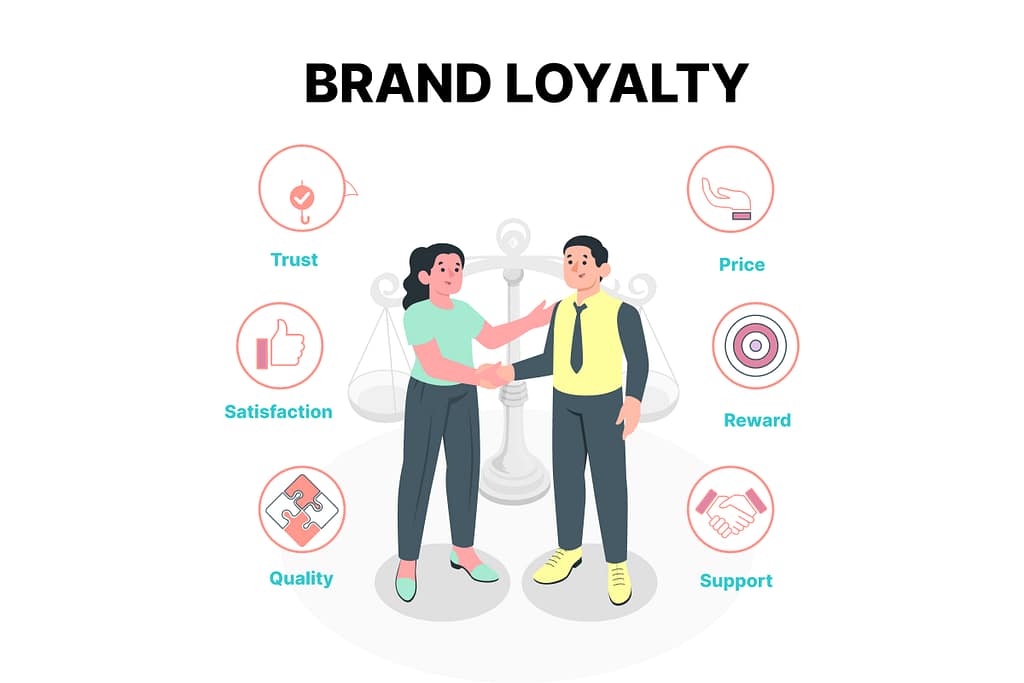In today’s rapidly evolving business landscape, one cannot emphasize enough the importance of branding in marketing. It’s not merely about having a catchy logo or a memorable slogan; it’s about creating a holistic experience that resonates with your target audience, ultimately leading to customer loyalty and increased market share. Let’s delve deeper into this significant aspect of modern marketing.
Importance of branding in Marketing: More Than Just a Name

An effective brand is much more than just a name or logo. It’s a powerful means of communication that conveys your business’s identity, values and promises to your customers. At its core, branding represents the total experience that your customers have with your company, product, or service.
Your brand embodies who you are, who you want to be, and how people perceive you to be. The importance of branding is all about how well you communicate these elements to your market. A strong brand will make you stand out in an increasingly crowded market, making it a vital aspect of any marketing strategy.
Building Trust and Recognition

Branding has a direct influence on consumer trust and brand recognition. When your business has a strong and consistent brand, it gives customers a sense of familiarity. The more familiar customers are with your brand, the more likely they are to purchase your products or services. This is where the importance of branding in marketing truly shines.
Effective branding fosters trust and credibility with your target audience. If customers trust your brand, they will be more likely to recommend it to others, leading to increased referrals and brand awareness. Hence, the importance of branding can’t be understated when it comes to building a loyal customer base.
Differentiating Your Business

One of the major roles of branding is differentiation. In today’s hyper-competitive business environment, you must differentiate your company, products, or services from your competitors. The importance of branding in marketing comes into play by effectively setting you apart from the crowd, creating a unique identity, and offering a unique value proposition.
Brands that effectively differentiate themselves consistently communicate their unique selling points to their target audience. This involves a deep understanding of your market and competition, and strategically positioning your brand to capitalize on your unique strengths.
Influencing Decision-Making

The importance of branding extends to the customer decision-making process. A strong brand can influence customers’ purchasing decisions by conveying the value of your products or services, establishing emotional connections, and encouraging loyalty.
Consider iconic brands like Apple or Coca-Cola. Their branding goes beyond just a logo or a tagline; they create a narrative that resonates with their customers, resulting in strong emotional connections. These brands have fully realized the importance of branding in marketing and have leveraged it to influence their customers’ behaviors and perceptions.
Nurturing Loyalty and Advocacy

Effective branding fosters customer loyalty and advocacy, another testament to the importance of branding in marketing. Loyal customers not only make repeat purchases but also become advocates for your brand, spreading positive word-of-mouth and attracting new customers.
The key to nurturing brand loyalty lies in consistently delivering on your brand promise, providing excellent customer experiences, and engaging with your customers. Remember, a brand is not just about what you say you are, but what you consistently prove to be.
Key Components of Effective Branding

When it comes to establishing a successful brand, the task extends far beyond simply persuading your target audience to select you over your competitors. It’s about proving to your potential customers that you’re the only solution to their problem or the perfect match for their needs. At its essence, branding serves as a problem-solving tool.
An effective brand should:
- Communicate its message succinctly and transparently.
- Affirm its credibility within the marketplace.
- Foster an emotional connection between the product or service and the target consumers.
- Stimulate the customer to complete a purchase.
- Foster enduring customer loyalty.
Understanding Your Customers for Successful Branding

Achieving branding success necessitates a deep comprehension of your customers’ and prospects’ needs and wants. This can be facilitated by ensuring your brand strategies permeate every facet of your organization and are evident at all public engagement points.
Think of your brand as if it were a living, breathing entity. Imagine this entity introducing itself, defining its worth, and articulating what it has to offer.
As your brand starts to resonate with customers, clients, and prospects, it will take root in their hearts and minds. They will begin to identify with your brand, establishing an emotional connection that is pivotal for sustained loyalty and engagement.
The Imperative of Strategic Branding in Business Growth

Regardless of a company’s size, there’s no such thing as an infinite marketing budget. This truth underscores the significance of strategic branding efforts that balance both short-term results and long-term growth. All businesses, regardless of their industry or size, need to grasp the importance of branding in marketing.
Certainly, branding can be a sizable investment. Yet, the returns from a well-executed branding strategy can be exponential, demonstrating the importance of branding for businesses. This discussion is particularly relevant for business owners, managers, and decision-makers who might be contemplating whether or not to channel resources into branding. Recognizing the branding importance in marketing can significantly influence a company’s trajectory, underlining the necessity for businesses to prioritize their branding efforts.
Let’s evaluate the impact, significance, and benefits of effective branding-
Cultivating Consumer Preference with Branding
In an environment of abundant choices, consumers often grapple with decision-making. One strategy they adopt is gravitating toward familiar and trusted brands. Well-established brands, thus, present a lower risk for consumers. This underscores the importance of branding, as customers often perceive products from intensively marketed brands as superior performers. Hence, by prioritizing branding, businesses ensure their longevity in the market.
Powering Revenue Growth and Market Expansion

The branding importance in marketing is evident when you consider the correlation between extensive branding efforts and increased revenues and market share. A strong brand not only fortifies a company’s market position but also enables it to explore new geographic markets, pursue co-branding opportunities, and unlock fresh distribution channels. Consequently, investing in branding provides the impetus for exploring diverse market segments.
Safeguarding Against Temporary Crises
The resilience offered by strong branding becomes particularly crucial during times of crisis. Toyota, for instance, faced significant product quality issues in 2009. However, thanks to the years spent building its image of “quality,” the company managed to navigate the crisis and rebuild consumer trust. This instance underlines the importance of branding in marketing and crisis management, with brand recall playing a crucial role.
Boosting the Company’s Value

The true worth of a company isn’t solely determined by tangible assets like physical resources or the number of employees. The real magic lies in brand equity. As stated by John Stewart, former CEO of Quaker, “If the business splits up and I give you the land, bricks, and cement, and take the goodwill and trademarks, I’d still stand better than you.” This remark briefly captures the importance of a brand in determining a company’s value.
Deterrence Against New Competition
The importance of a brand in marketing becomes even more pronounced when you consider its role in warding off new competitors. A market segment dominated by a popular brand presents a formidable challenge for newcomers. Being a pioneer in creating and targeting a market segment can yield immense advantages, reinforcing the importance of a ‘first-mover advantage’. This strategic positioning helps brands secure a permanent place in consumers’ minds.
Boosting Employee Productivity through Branding

A well-recognized brand not only attracts customers but also draws in talented professionals. With access to top talent, your business stands to benefit from increased productivity, further underlining the importance of a brand.
Elevating Profitability by Justifying Higher Pricing

One of the key branding importance in marketing aspects is the ability to command higher prices for your products or services. Consumers are generally more amenable to paying a premium for products from reputable brands compared to lesser-known counterparts.
Leveraging Brand Power for Supplier Negotiations
Being a large firm and a key client for your suppliers confers significant negotiation power. You can insist on timely delivery and quality products while also negotiating on prices. Often, suppliers may even accept lower payments to maintain their relationship with your brand.
Attracting New Distribution Channels

A popular brand, backed by loyal customers, can easily find distribution partners on both local and global scales. It’s an attractive proposition for distributors to partner with a brand that assures high consumer demand and return on investment.
Reducing Employee Turnover Rate
Employees often take pride in being associated with a renowned brand, fostering a sense of loyalty and purpose. This results in lower turnover rates as employees believe in their company’s mission and values, again emphasizing the importance of branding.
Crafting a Unique Brand Image
A brand extends beyond merely offering tangible products or services. If your brand stands distinct from the rest, it’s likely to attract a market segment untouched by competitors.
Attracting Investors

Investors naturally gravitate towards brands that are strong enough to captivate their target audience and sincere enough to earn their trust. They are unlikely to invest in a brand that seems weak and carries potential risks.
Investing in your brand opens up limitless growth opportunities. The key is to execute your branding strategy in a way that maximizes impact, thereby reiterating the importance of branding in marketing. Remember, the importance of a brand in shaping your business’s future is immense.
Conclusion
In conclusion, the importance of branding in marketing is multi-faceted and immense. From building trust and recognition, differentiating your business, influencing decision-making, nurturing loyalty, and advocacy, branding is at the heart of marketing. By understanding and leveraging the importance of branding, businesses can build strong brands that resonate with their target audience, giving them a competitive edge in the crowded marketplace.
The success of a company doesn’t just rely on the quality of products or services offered; it also heavily depends on the strength of its brand. By emphasizing the importance of a brand in their marketing strategies, businesses can ensure they are memorable and preferred in the minds of their customers.
In essence, effective branding equates to a significant return on investment, sustained growth, and long-term business success. The importance of branding in marketing, therefore, should never be underestimated.
Navigating the Branding Landscape with Wilson Wings
With a team of seasoned branding experts at Wilson Wings, we’re poised to infuse your business with innovative ideas that will help it thrive. Reach out to us today to schedule a complimentary consultation, and let’s explore how a tailored branding strategy can fuel your company’s growth. The importance of branding is evident, and here at Wilson Wings, we fully appreciate the branding importance in marketing, making us your ideal partner in amplifying the importance of your brand.





